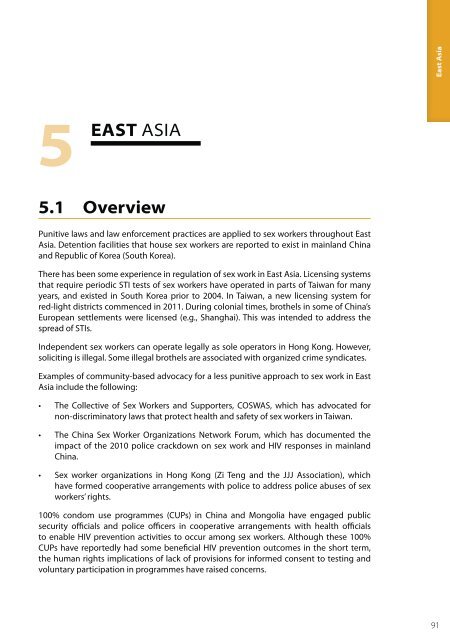SEX WORK AND THE LAW - HIV/AIDS Data Hub
SEX WORK AND THE LAW - HIV/AIDS Data Hub
SEX WORK AND THE LAW - HIV/AIDS Data Hub
You also want an ePaper? Increase the reach of your titles
YUMPU automatically turns print PDFs into web optimized ePapers that Google loves.
East Asia<br />
5<br />
EAST ASIA<br />
5.1 Overview<br />
Punitive laws and law enforcement practices are applied to sex workers throughout East<br />
Asia. Detention facilities that house sex workers are reported to exist in mainland China<br />
and Republic of Korea (South Korea).<br />
There has been some experience in regulation of sex work in East Asia. Licensing systems<br />
that require periodic STI tests of sex workers have operated in parts of Taiwan for many<br />
years, and existed in South Korea prior to 2004. In Taiwan, a new licensing system for<br />
red-light districts commenced in 2011. During colonial times, brothels in some of China’s<br />
European settlements were licensed (e.g., Shanghai). This was intended to address the<br />
spread of STIs.<br />
Independent sex workers can operate legally as sole operators in Hong Kong. However,<br />
soliciting is illegal. Some illegal brothels are associated with organized crime syndicates.<br />
Examples of community-based advocacy for a less punitive approach to sex work in East<br />
Asia include the following:<br />
<br />
<br />
<br />
The Collective of Sex Workers and Supporters, COSWAS, which has advocated for<br />
non-discriminatory laws that protect health and safety of sex workers in Taiwan.<br />
The China Sex Worker Organizations Network Forum, which has documented the<br />
impact of the 2010 police crackdown on sex work and <strong>HIV</strong> responses in mainland<br />
China.<br />
Sex worker organizations in Hong Kong (Zi Teng and the JJJ Association), which<br />
have formed cooperative arrangements with police to address police abuses of sex<br />
workers’ rights.<br />
100% condom use programmes (CUPs) in China and Mongolia have engaged public<br />
security officials and police officers in cooperative arrangements with health officials<br />
to enable <strong>HIV</strong> prevention activities to occur among sex workers. Although these 100%<br />
CUPs have reportedly had some beneficial <strong>HIV</strong> prevention outcomes in the short term,<br />
the human rights implications of lack of provisions for informed consent to testing and<br />
voluntary participation in programmes have raised concerns.<br />
91
















